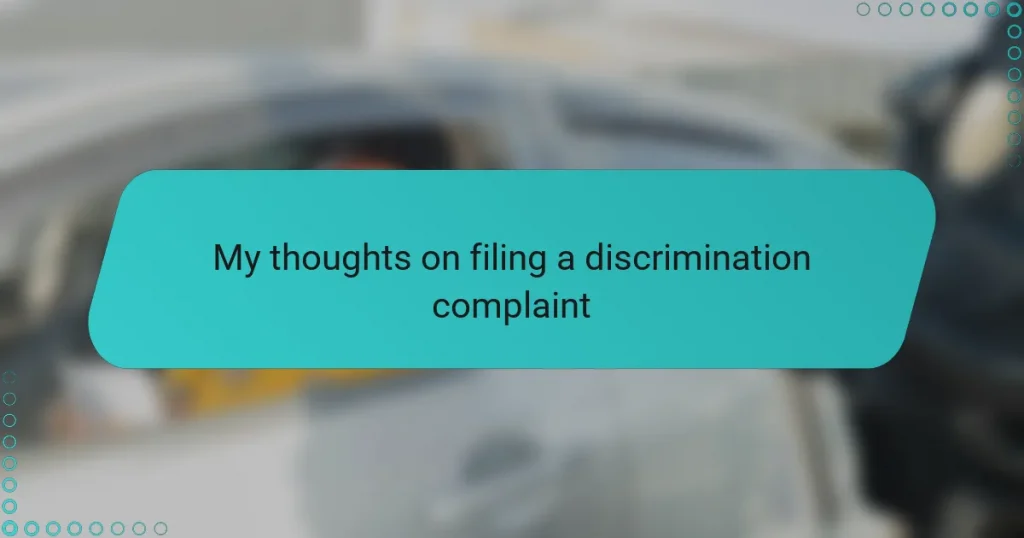Key takeaways
- Discrimination complaints require understanding both the legal framework and the personal experiences behind them.
- Gathering evidence is crucial for strengthening a complaint and providing clarity about one’s experience.
- Filing a complaint involves navigating complex systems, which can be overwhelming but is essential for achieving justice.
- The emotional toll of reliving painful events and the challenges in gathering evidence can discourage individuals from pursuing valid complaints.
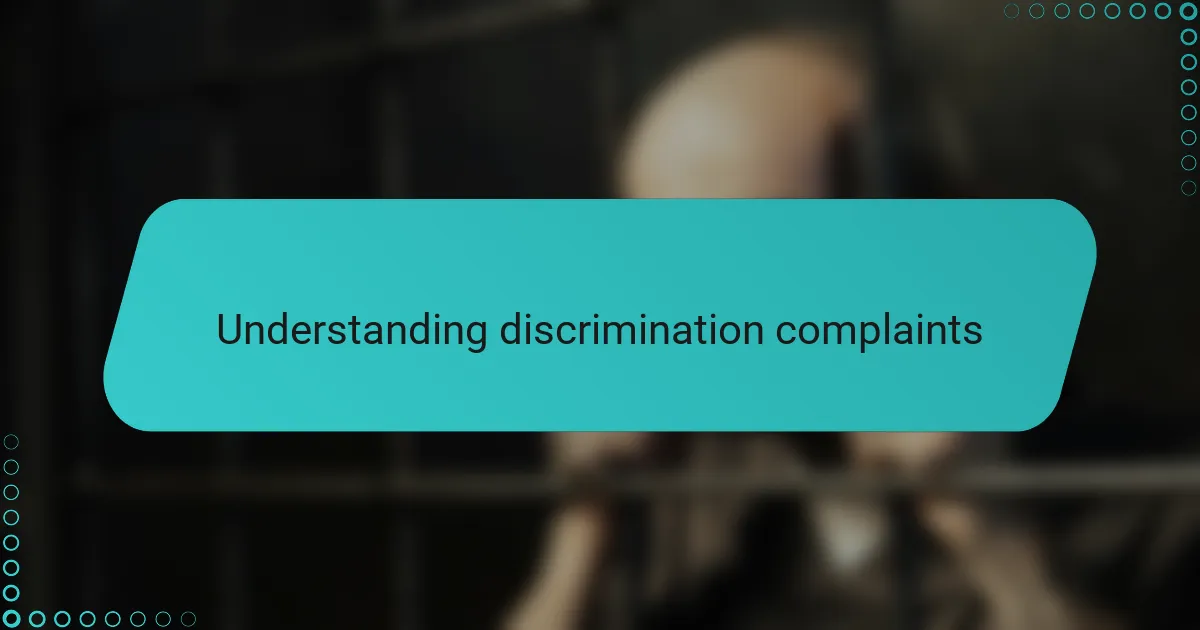
Understanding discrimination complaints
Discrimination complaints are more than just paperwork; they represent a person’s courage to speak up against unfair treatment. From my experience, understanding what qualifies as discrimination—whether based on race, gender, age, disability, or other protected categories—is the first step in making sense of this process. Have you ever wondered what really counts as discrimination in the eyes of the law?
I recall a moment when I helped someone unsure if their experience at work was discriminatory. It turned out, subtle biases and patterns of exclusion were enough to form a legitimate complaint. Recognizing these often invisible barriers can be empowering, but also emotionally challenging because it forces you to name and confront uncomfortable truths. Isn’t it striking how what feels personal can also be a legal issue?
Knowing the legal standards and definitions is crucial, but it’s equally important to acknowledge the emotional weight behind filing a complaint. People don’t just check boxes—they seek justice and validation for harm endured. So, understanding discrimination complaints means appreciating both the legal framework and the human stories tangled within.
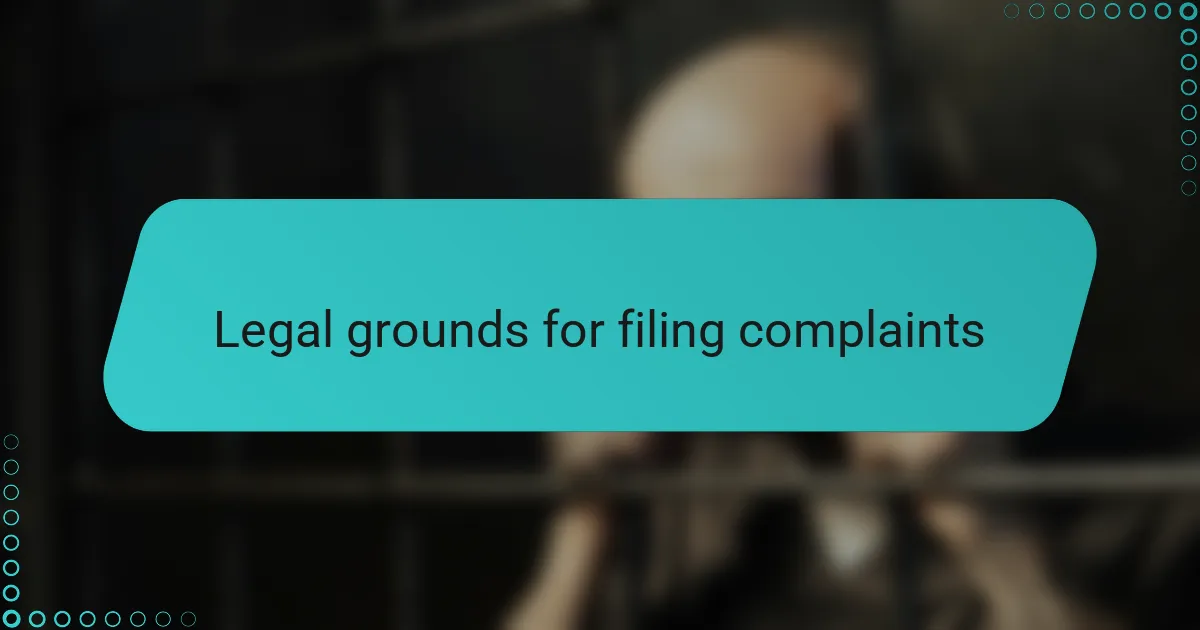
Legal grounds for filing complaints
Legal grounds for filing a discrimination complaint rest on clearly defined protections under laws like the Civil Rights Act or the Americans with Disabilities Act. From my experience, these laws specify categories such as race, gender, age, and disability, ensuring that unfair treatment in places like work or housing isn’t just ignored. Have you ever paused to think about how these legal categories translate into real-life situations where someone might feel excluded or marginalized?
I once assisted a client who wasn’t sure if a series of repeated comments at work qualified as discrimination. It turned out that even subtle, persistent actions that create a hostile environment meet the legal threshold for a complaint. This showed me how important it is to understand not only blatant acts of discrimination but also the less obvious patterns that the law recognizes.
But what really stands out to me is how these legal grounds give people a voice when they’ve been hurt by unjust treatment. Is it legal protection alone that empowers someone to take that step? I believe it’s the recognition that their experience matters, and that the law can be a tool to challenge unfairness—not just a list of rules to follow.
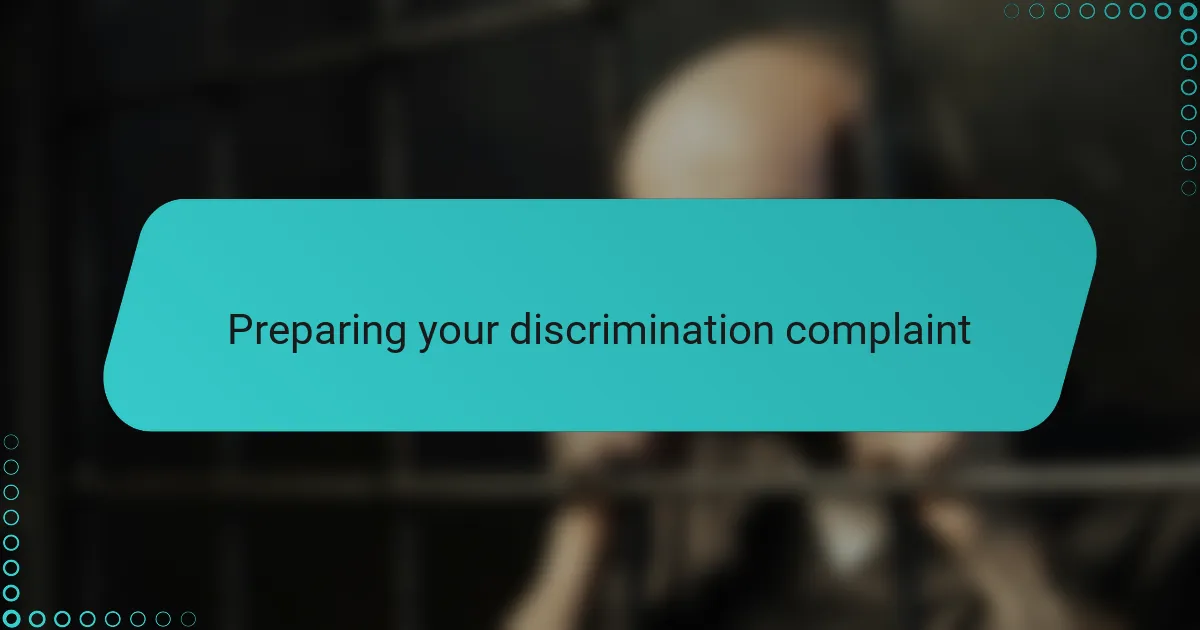
Preparing your discrimination complaint
Preparing your discrimination complaint means gathering every piece of evidence that shows what happened and how it affected you. I remember helping someone who meticulously collected emails, witness statements, and even notes about incidents—they told me how this process made them feel more in control and less helpless. Have you considered how documenting these details not only strengthens your case but also helps you clarify your own experience?
It’s important to articulate your complaint clearly, focusing on the facts and the impact discrimination had on you, rather than getting overwhelmed by emotions. From experience, framing your story this way can make a big difference when legal professionals review it. How often do we forget that the way we tell our story can influence the response we receive?
Lastly, I always advise people to be patient and persistent when preparing their complaint. It’s not just about ticking boxes quickly; it’s about crafting a thorough and honest account that reflects the injustice faced. Have you ever noticed how this kind of preparation, though challenging, can be an empowering step toward reclaiming your voice?
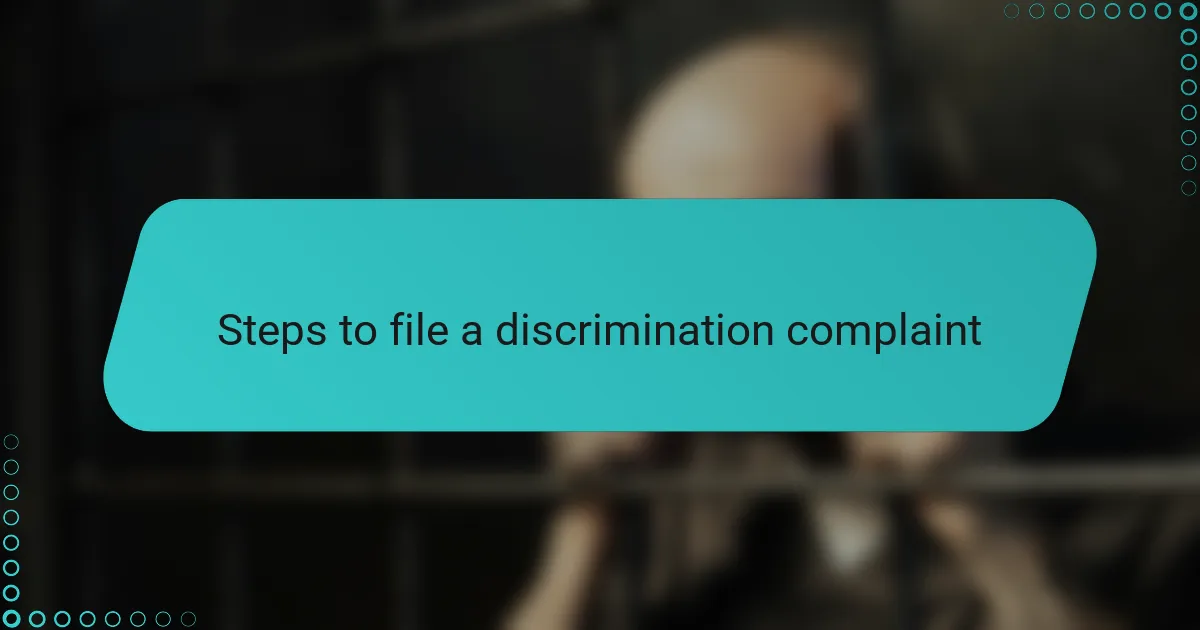
Steps to file a discrimination complaint
Filing a discrimination complaint usually starts with identifying the right agency or organization to submit your claim. When I first guided someone through this, I noticed how daunting it was for them to navigate between local human rights commissions and federal bodies like the EEOC. Have you ever felt overwhelmed by choosing the correct path in a complex system? It’s normal, but knowing where to go is critical for your complaint to be heard.
Next, filling out the complaint form carefully and truthfully is essential. From what I’ve seen, this is where people sometimes rush or second-guess themselves, fearing their story won’t be taken seriously. I always encourage the individuals I work with to take their time and focus on presenting clear facts alongside the personal impact—because your experience deserves to be respected and understood.
Finally, once the complaint is filed, patience becomes your ally. I recall advising someone who was frustrated by the waiting period after submitting their complaint. While it may feel like nothing is happening, investigations take time and each step is part of building a fair resolution. Have you considered how persistence can transform waiting from anxiety into a quiet form of strength?
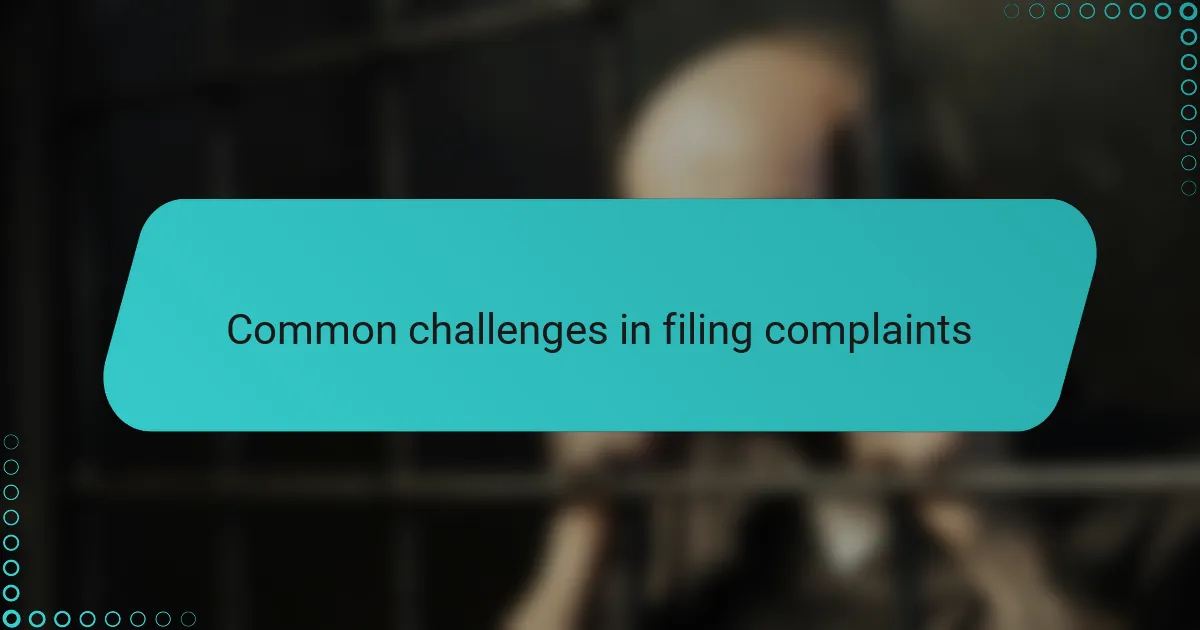
Common challenges in filing complaints
One challenge I’ve seen often is the emotional toll that comes with filing a discrimination complaint. It’s not just about describing events; it means reliving painful moments, and that fear of being dismissed or not believed can be overwhelming. Have you ever hesitated to speak up because you worried it might just make things worse?
Another hurdle is the complexity of the legal process itself. From my experience, many people feel lost navigating forms, deadlines, and deciding which agency to approach. I remember working with someone who almost gave up because the system seemed like an endless maze. How can we expect individuals to advocate for themselves when the path is so confusing?
Lastly, gathering sufficient evidence stands out as a common struggle. It’s one thing to feel wronged, but proving discrimination requires documentation that’s not always easy to obtain. I recall a client who painstakingly collected emails and testimony over months, learning that patience and persistence were just as important as the facts themselves. Doesn’t it make you wonder how many valid complaints never get filed simply because gathering proof feels impossible?
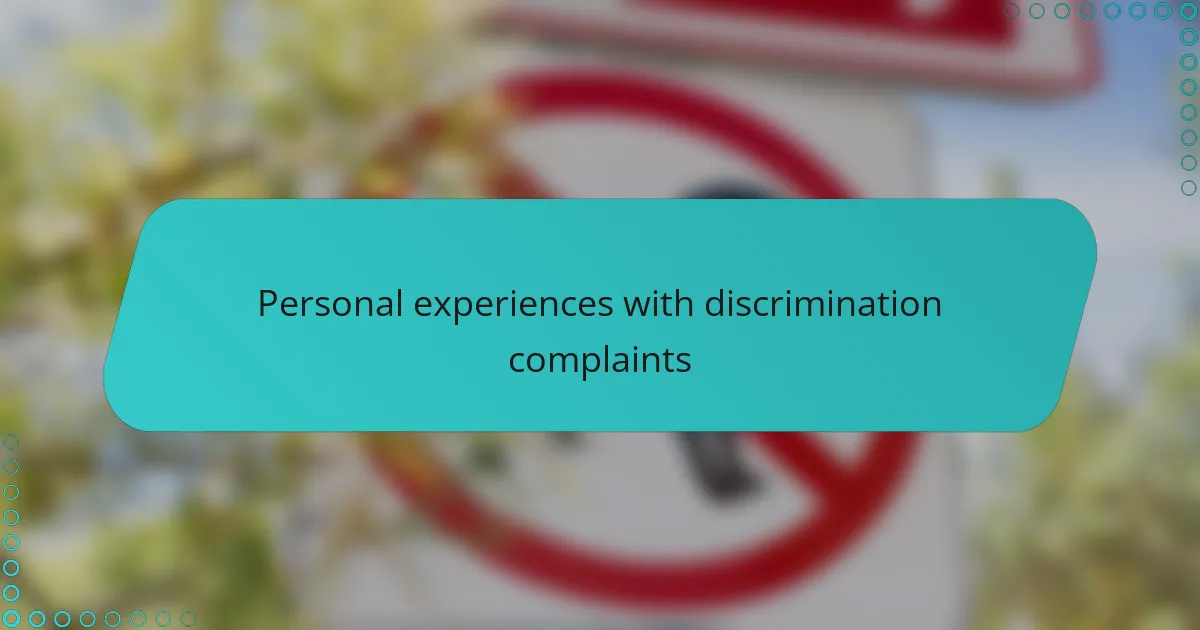
Personal experiences with discrimination complaints
I once supported a colleague who filed a discrimination complaint after persistent subtle remarks undermined their confidence. Watching them wrestle with doubt and fear, yet ultimately choosing to stand up, underscored for me how personal and daunting this step can be. Have you ever felt torn between silence and speaking out, unsure if the fight is worth it?
Another instance involved a client who described feeling isolated not just by discrimination itself but by the lengthy complaint process that seemed to drag on endlessly. Their frustration was palpable—waiting for a response can feel like your voice has been muted rather than amplified. Does that experience resonate with you, especially when seeking justice feels like navigating a maze?
On the flip side, I’ve witnessed moments where filing a complaint brought profound relief and a sense of reclaiming dignity. One person told me that simply documenting their experience gave them clarity and strength they hadn’t realized they had. Isn’t it remarkable how confronting the pain can sometimes unlock a surprising source of empowerment?
